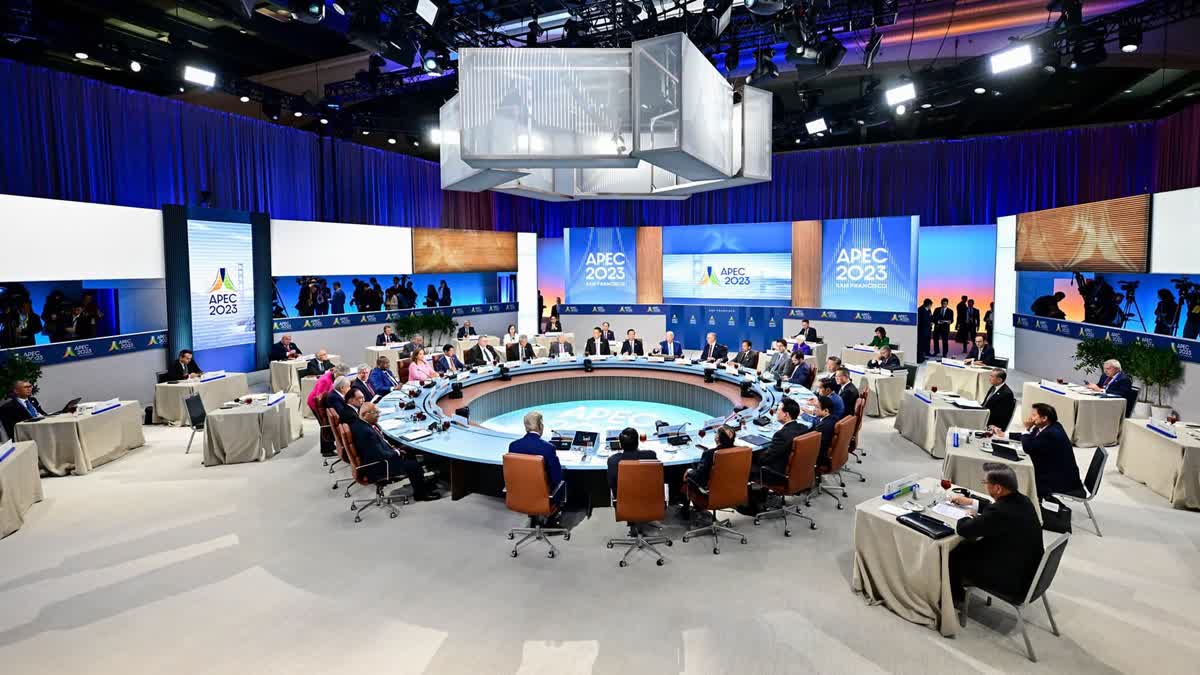Hyderabad: The meeting of the leaders of the Asia-Pacific Economic Co-operation (APEC) forum concluded on November 17, 2023 at San Francisco, United States of America. In the wake of this meeting, the issue of India’s membership in the APEC forum once again became a hot topic of discussion in the policy circles and financial press, given its strategic importance to India. APEC is a regional economic forum, formed in 1989.
At present it has 21 member countries, which accounts for almost half of the world trade and 62 percent of world GDP, with a whopping 2.9 billion population. The members include Australia, Brunei, Canada, China, Hong Kong, Chile, New Zealand, Papua New Guinea, the Philippines, Indonesia, Japan, South Korea, Russia, the United States, Mexico, Peru, Malaysia, Singapore, Thailand and Taiwan, and Vietnam.
This group operates based on the collective decisions which are taken through consensus and commitments that the members undertake on voluntary basis. Unlike many other multi lateral institutions, the commitments here are non-binding. APEC operates with an objective of leveraging growing interdependence of Asia-Pacific region and creating prosperity for the people of this region, through regional economic integration.
Since its formation, APEC championed the cause of lowering tariffs on trade, promotion of free trade and strived towards economic liberalization. These policies largely contributed to the development of the Asia-Pacific region.
Why India is not a Member of APEC:
Despite the strategic importance and the economic clout of APEC, India is not a part of it. India’s request made in 1991, to be a part of this group, was not admitted, due to the objections of certain members. Later it could not enter this grouping, as there was a membership freeze that came into effect in 1997 and extended till 2012.
In addition to this, it is to be noted that APEC is a group of countries that came together from ‘Pacific’ region. But India does not have a Pacific coast line. This extra regional status of India is also one of the reasons for the country, not becoming a member of APEC. The third reason for India’s non inclusion in APEC is the fear of some members that its inclusion may bring imbalance in the Asia-Pacific representation, with the group getting dominated by Asian powers.
Also read: Does India need permanent membership of APEC or vice versa?
This stems from the fact that already APEC has countries like China, Japan, South Korea and six other ASEAN states as its members. Now they fear that decision making in APEC could largely go in favor of Asian region of India is also included in the group. However the moratorium on new membership in APEC is not there since 2012 and since then there has been an increasing push from India, to join the grouping.
Even many members of this groping are also in support of India joining the group, given its stellar performance on the front of economic reforms and liberalization.
A Sea of Opportunities
India understands the fact engaging APEC will have the benefits of having close economic ties, getting open market access to the major economies of the world and also facilitates trade and investment flows. Thus India has been maintaining its relationship between APEC in the capacity of an observer till now. In fact it expanded its investment and trade relation with this region from the early 2000s through the Comprehensive Economic Cooperation Agreements with Malaysia and Singapore and also the Indi-ASEAN Free Trade Agreement.
However a full time membership could simply trade procedures, reduce transaction costs with APEC and thus boosting India’s exports. India can also bring in advanced technology from APEC nations, through technology transfer and also adapt their best practices to improve productivity.
On the other hand, granting membership to India will act as catalyst for trade reforms in the Asia-Pacific region and the APEC countries can also use India strategic relations with the major world powers and the country’s maritime strength, to improve the strategic balance of APEC grouping. Moreover, India is the fifth largest economy in the world and its percentage share in the global GDP more than doubled in the last three decades.
If India is included in APEC, it gives the member countries, an access to 130 billion plus consumer market, huge work force with the skill sets and large scale investment opportunities.
Challenges Ahead
While the APEC membership to India offers a wide range of opportunities to both the sides, there are issues that India needs to resolve, before making a strong claim for the membership. First and foremost, India needs to overcome the present trade barriers and bring its trade regulations and the trade standards, on par with the APEC’s regulations.
On the other hand it needs to address the issues like removal of non-tariff barriers to trade, reduction of tariffs. Third challenge is to address the sensitivities that could arise due to market access to APEC members. This is due to the fact that many of the APEC members have an advanced technology and higher levels of productivity.
If their products are given access to Indian markets, it could hurt the domestic businesses, at least in the short term. This challenge need to address by making necessary domestic market adjustments and bringing in reforms. Last but not the least, India needs to bring in parity with the APEC forum in various aspects like gender equality, green initiatives and the social equality in rural areas.
This entire criterion can be fulfilled by brining more reforms in all the fronts mentioned above, besides economic liberalization. This in turn could pave way for India’s membership in APEC in the near future.
(The author is an Assistant Professor, Department of Business Management, H.N.B.Garhwal University, Srinagar Garhwal, Uttarakhand).



